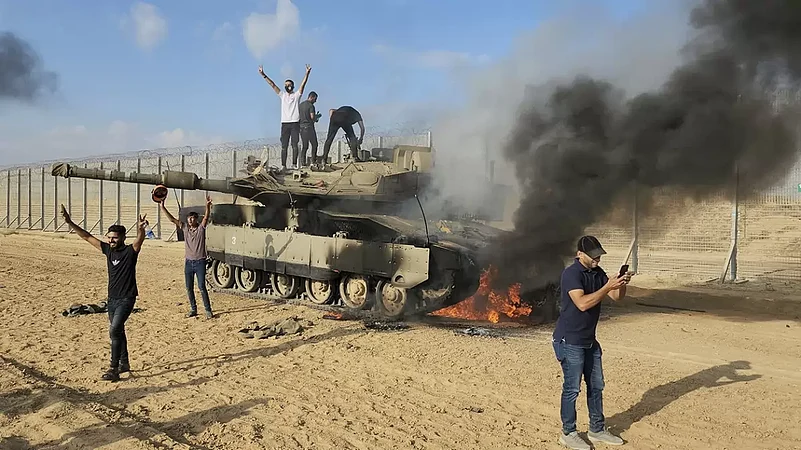The all-out Hamas offensive on the 50th anniversary of the Yom Kippur War came as a surprise to the Israelis.
Israelis across the country woke up to blaring sirens on Saturday morning as the Palestinian terrorist group Hamas rained rockets on the Israelis. So far, at least 40 Israelis have been killed and 545 have been hospitalised, 70 of them in serious condition, according to the authorities. The toll is expected to rise.
At least 198 people in the Gaza Strip have been killed in Israel's retaliation and at least 1,610 wounded, the Palestinian Health Ministry in Gaza said.
In the midst of such a situation, which the Israeli government has described as an all-out war, former intelligence officers have called the Hamas attack an "intelligence failure" as the authorities failed to prevent the breach in multiple locations. They have also drawn parallels with the Yom Kippur War wherein also intelligence failure was held as the region for the unpreparedness for the war.
Defense Minister Yoav Gallant, vowing victory and stating that Hamas had made a significant error, initiated a military reserve call-up, the extent of which would depend on the evolving crisis.
By late morning, it was reported that Hamas had fired more than 2,000 rockets into Israel. Just before noon, Prime Minister Benjamin Netanyahu officially declared that 'Israel was at war', with the IDF's spokesperson echoing this sentiment and cautioning against inaccurate claims and fake news amid unconfirmed reports of Israeli military and civilian casualties.
How did the terrorists enter Israel?
The Israeli Defense Forces (IDF) confirmed that dozens of terrorists had infiltrated Israel through various means, breaching the once-thought impenetrable border fence, with some arriving by land, others using hang-gliders, and rumours of sea arrivals as the rocket and mortar attacks persisted.
Israel's fortified border fence along the Gaza border was breached in multiple locations, as reported by Army Radio. Ongoing clashes and rapid deployment of IDF special forces were witnessed in various southern residential areas, prompting residents near the Gaza border to remain indoors with locked doors.
Police Commissioner Kobi Shabtai spoke of 21 "active scenes" across southern Israel, with reported casualties, including fatalities, amid censorship restrictions. Security forces confronted numerous terrorists in Sderot, where it was reported that "dozens of terrorists" were present.
Palestinians from Gaza exploited the breaches in the security fence to cross into Israel. At the same time, reports from a southern kibbutz described Hamas gunmen operating in the area, and residents reported gunmen moving door-to-door, firing at homes and setting them on fire.
Was it an intelligence failure for Israel?
According to The Times Of Israel, Amos Yadlin, a former IDF intelligence chief, drew parallels with the Yom Kippur War, calling this an "intelligence failure" that led to the enemy initiating conflict.
Nonetheless, Yadlin emphasized the need for calm, highlighting the immediate priority as tracking down and dealing with the terrorists inside Israel and preventing the conflict from spreading to other fronts, particularly Hezbollah in the north.
The Times of Israel also reported that the assumption that such an attack would not occur out of a fear or a strong retaliation also proved to be false.
"The IDF’s assumption, in recent years, was that Hamas was deterred from carrying out major attacks in Israel — fearing the potency of Israel’s response, and wary of plunging Gaza into renewed devastation. All too evidently, that assumption was unfounded," reported ToI.
Israeli newspaper Haartez also reported that the attack happened despite officials last week assessing that Hamas wished to avoid a full-fledged war with Israel, which commentators have said points to an intelligence and assessment failure.
"Despite the recent violent escalation near the Gaza border in recent weeks, senior security officials assessed last week that Hamas wishes to avoid a full-fledged war with Israel. The officials claimed that Hamas would not wish to jeopardize past achievements that bettered the lives of the Gazan residents," reported Haaretz.
While Israel's political leaders convened for emergency discussions, the true scope of the infiltration and its repercussions remained uncertain. Hebrew media began quoting unnamed officials criticizing both the political and military leadership for being caught off guard due to internal disputes. Some likened the situation to a war with Gaza unlike any previously experienced.


















.png?w=200&auto=format%2Ccompress&fit=max)







